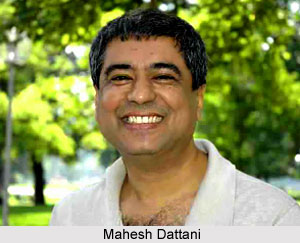 Mahesh Dattani was born on 7th august, 1958 in Bengaluru in the Indian state of Karnataka. He got the prestigious National Sahitya Akademi Awards for `Final Solutions` and Other Plays in 1994. Born and based in Bengaluru, he studied dancing, worked as an advertising copywriter, and ran the family business, while forming his own English-theatre group named Playpen in 1984. He became a full-time writer in 1995 and set up his own intimate performance venue in 1998. He also acts and directs for Playpen, and composes radio drama and screenplays.
Mahesh Dattani was born on 7th august, 1958 in Bengaluru in the Indian state of Karnataka. He got the prestigious National Sahitya Akademi Awards for `Final Solutions` and Other Plays in 1994. Born and based in Bengaluru, he studied dancing, worked as an advertising copywriter, and ran the family business, while forming his own English-theatre group named Playpen in 1984. He became a full-time writer in 1995 and set up his own intimate performance venue in 1998. He also acts and directs for Playpen, and composes radio drama and screenplays.
Dattani wrote his first full-length play, Where There`s a Will, on family inheritances, in 1986 followed by Dance like a Man in 1989 on the problems faced by a male dancer. He directed and acted in both, then directed Bravely Fought the Queen in 1991 in Bombay. Meanwhile Alyque Padamsee had directed his third play, Tara in 1990, a touching domestic drama, and invited him to script a work on communalism. The product, Final Solution, was rejected by the Deccan Herald Festival in Bengaluru for dealing with a sensitive issue, though they had sponsored his first two productions. Playpen finally staged it in 1993. The delicate theme led him to create perhaps too perfect a Hindu-Muslim equilibrium, almost consciously free of any perceivable bias.
Gay presence in Dattani`s work increases with the play Do the Needful in 1997. This was written for BBC Radio 4, the plot centres on the negotiations for an arranged marriage between Alpesh, a Gujarati man, and Lata, a South Indian Kannada woman. As the play progresses it is revealed that the woman is not agreeable to the marriage because she loves Salim, a Muslim man, while the prospective groom is in love with a man named Trilok. Although she tells Alpesh about her love for another man, Alpesh keeps quiet about his homosexual relationship. Alpesh`s homosexuality is revealed to Lata when she surprises him and the gardener of her family having sex in the cowshed, just as she is about to run away to Salim. At first horrified, she subsequently decides that the best way to deal with the situation is to marry Alpesh, so that they can lead separate sexual lives yet keep up the appearance of a happy couple. This is a clear example of a common compromise in a society that has criminalized non-procreative sex since 1862.
The joint family forms the core of Dattani`s theatre, which has a strong sense of social and domestic history. Yet he also has an unforced, appealing wit. All the plays bear witness to his imagination. Dattani moves freely back and forth in time, typically between generations, occasionally requiring performers to act both in order to stress the links within the generation gap. He constructs interesting spaces with split sets, hidden rooms, and lit passages revealed behind scrims. Mahesh Dattani was a representative of the new Indian who is not defensive about using English.
Playwright in Mahesh Dattani
* Where There`s A Will, 1986: The play is about the rift between the Hindu and the Muslim communities
* Dance Like a Man, 1989
* Tara, 1990
* Bravely Fought the Queen, 1991
* Final Solutions, 1993
* On a Muggy Night in Mumbai, 1998
* Seven Circles Round The Fire (Radio play for BBC), 1998
* 30 days in September, 2001
* Brief Candle, 2009
Filmography by Mahesh Dattani
Director
* Mango Souffle
* Morning Raga
* Dance Like a Man
* Ek Alag Mausam
Awards Received by Mahesh Dattani
* Dance Like a Man has won the award for the Best Picture in English awarded by the National Panorama In 1998
* Sahitya Academi Award for his book of plays Final Solutions and Other Plays
* Sahitya Kala Parishad selected Final Solutions (1997), Tara (2000) and 30 days in September (2007) as Best productions of the year directed by Arvind Gaur.




















